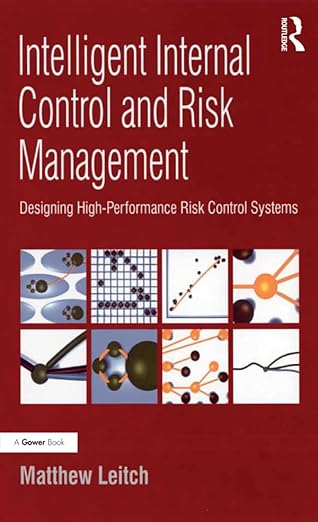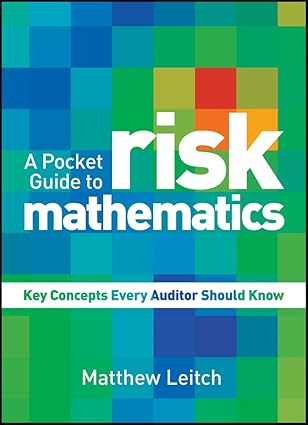
Matthew Leitch, educator, consultant, researcher
Real Economics and sustainability
Psychology and science generally
OTHER MATERIALWorking In Uncertainty
Related books
Working In Uncertainty (WIU) is a perspective on business and personal improvement, and on risk management and internal control, that promotes the idea of making incremental changes to core management activities and basic business processes so that they work better in the face of uncertainty. Many books provide knowledge related to this.
Books by Matthew Leitch

Intelligent internal control and risk management by Matthew Leitch: At the moment there is no book called Working In Uncertainty that explains the perspective. However, my first book has a lot of useful material in it. Staying within the risk control perspective and language it extends the concept of a 'control' and integrates risk management with internal control in a simple way. What this book calls 'intelligent controls' are typical of the changes to core management activities that improve performance in uncertainty. Part 2 is a collection of 60 controls that most organizations should use much more, including many intelligent controls.

A pocket guide to risk mathematics by Matthew Leitch: Although this book is aimed specifically at auditors, its clear explanations and tips on faults to watch out for are useful for anyone with an interest in the topic. What emerges is that 'risk' in mathematics is a young and poorly formulated idea when compared with the long heritage of 'probability' and 'value'. The book explains several common mistakes in 'risk analysis'.
These really are key ideas that every auditor should know.
Other useful reading
Thinking about uncertainty
10-10-10: A Life-Transforming Idea by Suzy Welch: Don't judge a book by its cover. This one is by the much younger wife of a very rich and famous American businessman, it is lightweight almost beyond belief, and the slogan on the cover suggests this is typical self-help mumbo jumbo about envisioning the life you want. Indeed, this book is to be found on the self-help shelves.
But, the slogan on the cover totally misrepresents the book. Suzy is not saying we can just fantasize about the life we want and hey presto. She is saying that, when we face a decision, we should clarify our choices, consider the potential outcomes in 10 minutes, 10 months, and 10 years, then consider these in light of our values (what we would like perhaps), and select a course of action accordingly, after considering all of the aforementioned. This idea is explained in a few pages, elaborated a little, then illustrated by many examples of life decisions, usually from a decidedly female point of view.
Judgment under Uncertainty: Heuristics and Biases edited by Daniel Kahneman, Paul Slovic, and Amos Tversky: This is a classic collection of papers on the subject and covers many useful topics.
Judgment and Decision Making by David Hardman: A useful textbook with good coverage. David also has a very interesting blog.
Uncertainty: A Guide to Dealing with Uncertainty in Quantitative Risk and Policy Analysis by Millett Granger Morgan and Max Henrion: Another classic.
The Flaw of Averages by Sam Savage: Professor Savage is a fan of Monte Carlo simulation and knows how to make it easy, fun, and useful. He shows that, with nothing more than an Excel spreadsheet, you can visualise and understand uncertain future events much more easily than most people realise.
Management tools developed using his ideas and software are useful and look cool.
The art of decisions by Chris Blake: This is a book about decision making in an uncertain world with the strong poker theme. I think the coverage of typical decision making problems caused by underestimating uncertainty is excellent and there are many good examples.
Making Robust Decisions by David Ullman: This has a very strong focus on uncertainty and uses Bayesian ideas, which is a good thing.
Strategy and performance
Beyond Budgeting: How Managers Can Break Free from the Annual Performance Trap by Jeremy Hope and Robin Fraser: This is the first book from the Beyond Budgeting Round Table and isn't really about budgeting at all. It's about how to manage more adaptively, using numbers for information rather than as a straight jacket.
Although the principles are rather general the book contains valuable examples from large, high performing companies that do not use budgetary control systems, but instead achieve superior control by more intelligent means. A great book.
Many of the techniques companies are using instead of budgetary control have a good effect on performance in conditions of uncertainty.
Implementing Beyond Budgeting: Unlocking the Performance Potential by Bjarte Bogsnes: Bjarte's experience of introducing more adaptive management at Borealis and Statoil are used to good effect in this more recent book on the Beyond Budgeting model.
Income to impact: Financial Stewardship of Public Sector and Not-for-profit by Adrian Poffley: Adrian Poffley is Chief Administrative Officer, Human Resources at the World Bank in Washington, and was Director of Finance at Sight Savers International. More importantly, he is one of the wisest and most interesting people working on more adaptive methods of management.
This newest edition of his book covers most things you need to know to look after the money in the public and not-for-profit sectors, but with Adrian's insights into the practicalities of doing it all in a world of challenging uncertainty.
The Balanced Scorecard: Translating Strategy into Action by Robert S Kaplan and David P Norton: The Balanced Scorecard approach, in various forms, has been adopted by many organizations. A lot of what Kaplan and Norton recommend is only moderately good under uncertainty, being a little too eager to fix targets. However, there is some great stuff in here in chapter 11 about strategic learning.
These are important points that most organizations should pay more attention to.
The Strategy-Focused Organization: How Balanced Scorecard Companies Thrive in the New Business Environment by Robert S Kaplan and David P Norton: This book followed on from 'The Balanced Scorecard' and again, in chapter 12 this time, there's some good stuff on learning. They advise treating the strategy map (i.e. a conceptual, causal model of how things work) as a set of hypotheses that need to be validated. (I would say 'validated' still sounds a little overconfident, but this is still a more open-minded position than many organizations achieve.)
Abolishing performance appraisals by Tom Coens and Mary Jenkins: Sadly, Tom Coens died after this book was published or I'm sure it would have been followed up with lots more. This brilliant analysis of the problems of all-in-one performance appraisals of individuals explains just why they don't work very well and tend to leave people feeling unhappy. The alternative is to break the process up into different types of appraisal for different purposes. If you've worked in a big organization and been subjected to the usual style of performance appraisal you will recognize the issues with painful ease.
Profiting from uncertainty: strategies for succeeding no matter what the future brings by Paul J H Schoemaker with Robert E Gunther: This is a very useful introduction to scenario planning techniques with a lot of decision theory ideas thrown in.
20 20 foresight: crafting strategy in an uncertain world by Hugh Courtney: This is a McKinsey & Company view, published by Harvard Business School Press, so it's interesting to see that 'risk' hardly gets a mention, while 'uncertainty' is mentioned constantly. I don't agree with some of the theory behind their levels of uncertainty, but the tour of potentially useful techniques contains lots of good ideas.
Experimentation Matters by Stefan H Thomke: One of the important ways to deal with imperfect knowledge and resulting uncertainty is to experiment, and to do it quickly and efficiently. This book is dedicated to this topic and includes many interesting examples.
Projects
Managing Project Risk and Uncertainty: A Constructively Simple Approach to Decision Making by Chris Chapman and Stephen Ward: This is a helpful book because, despite having the word 'risk' in the title, it is much more of an 'uncertainty' approach. The authors demonstrate a simple solution to the problem of how much analysis is enough. Constructive Simplicity is just starting simply and improving your thinking until there's no point in going further.
Managing Project Uncertainty by David Cleden: This is another approach to projects that focuses on uncertainty. The author has broken down strategies for handling uncertainty into some interesting groups: problem-solving strategies for managing uncertainty, knowledge-centric strategies, anticipation strategies, resilience strategies, and learning strategies.
Competitive Engineering by Tom Gilb: The techniques presented in this book do wonders for project management and beyond because they perform well in conditions of uncertainty. In fact, the greater the uncertainty, the greater the advantage of adopting Tom's methods.
The techniques have their impact despite the apparent lack of 'risk analysis' and 'risk management'.
Software inspection by Tom Gilb and Dorothy Graham: Although this book is aimed at the specifics of software inspection, the techniques have wider application than that. Just about anything written can be inspected and inspections done this way will find flaws quickly.
Once again, these are techniques that apply to core management activities and basic business processes and help to deal with uncertainty. In particular, inspection gives early feedback on quality and tends to help avoid that common syndrome of discovering that things are nearly finished for a very long time.
Information graphics
The Visual Display of Quantitative Information by Edward Tufte: The classic book on presenting data in a more informative way. Tufte doesn't show you how to make points with graphs. He shows you how to discover points with graphs. So, unlike most people writing on this topic, he doesn't assume you already have a conclusion and just want to make your data show it.
Miscellaneous EPUB2 formatted books
Reasonable influence (working draft epub file)
Self-management by reason (working draft epub file)
The Lucky Choices Theory of Ability (second edition) (working draft epub file)
Made in England